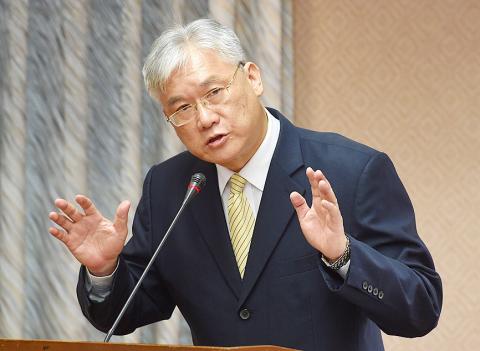Mainland Affairs Council (MAC) Minister Andrew Hsia (夏立言) yesterday defended President Ma Ying-jeou (馬英九) amid growing public discontent over his meeting on Saturday with Chinese President Xi Jinping (習近平), saying that Ma is the first Taiwanese politician to mention the Republic of China (ROC) Constitution in front of a Chinese leader.
Hsia made the remarks at a question-and-answer session at the legislature yesterday morning, in response to Democratic Progressive Party (DPP) Legislator Chuang Ruei-hsiung’s (莊瑞雄) criticism of Ma over his failure to publicly mention the “different interpretations” component to the “1992 consensus” at his meeting with Xi in Singapore.
“It is the first time a politician from our nation has spoken of the ROC, the ROC Constitution and the principle of ‘one China, with different interpretations’ in front of Chinese politicians. These terms have never been said more clearly. This is also the only time they have ever been mentioned before such an audience,” Hsia said.

Photo: Lo Pei-der, Taipei Times
Hsia jumped to Ma’s defense when Chuang accused the council and the president of only attaching importance to the photographs taken during the first official meeting between cross-strait leaders since 1949.
“Who has ever been valiant enough to make reference to the ROC, the ROC Constitution and the ‘one China, with different interpretations’ principle before Chinese politicians? President Ma is the first person to do so,” Hsia said.
Hsia said Ma clearly stated Taiwan’s stance regarding the “1992 consensus” and the “one China, with different interpretations” principle both at the closed-session of the meeting and a post-summit press conference.
The “1992 consensus” refers to a tacit understanding between the Chinese Nationalist Party (KMT) and the Chinese government that both sides acknowledge there is “one China,” with each side having its own interpretation of what “China” means.
While former Mainland Affairs Council chairman Su Chi (蘇起) admitted in 2006 to making up the term in 2000, it has been the KMT’s bedrock for engaging with China.
Hsia also turned down Chuang’s request to make public the complete text of Xi’s remarks at the closed-door session, saying that the council was not in a position to do so.
Asked whether Xi’s statements were too upsetting to be released, Hsia said: “Our remarks were irritating to them, and theirs to us.”
Hsia said it was entirely Ma’s decision to hold a post-summit press conference, while the Chinese only sent Taiwan Affairs Office Minister Zhang Zhijun (張志軍) to hold theirs, but that there was no question of inequality.
Hsia acknowledged the meeting was arranged hastily, giving his officials a score only close to the passing grade.
He said that the likelihood of a second Ma-Xi meeting was slim given that Ma’s presidency is set to expire on May 19.

A preclearance service to facilitate entry for people traveling to select airports in Japan would be available from Thursday next week to Feb. 25 at Taiwan Taoyuan International Airport, Taoyuan International Airport Corp (TIAC) said on Tuesday. The service was first made available to Taiwanese travelers throughout the winter vacation of 2024 and during the Lunar New Year holiday. In addition to flights to the Japanese cities of Hakodate, Asahikawa, Akita, Sendai, Niigata, Okayama, Takamatsu, Kumamoto and Kagoshima, the service would be available to travelers to Kobe and Oita. The service can be accessed by passengers of 15 flight routes operated by

Chinese spouse and influencer Guan Guan’s (關關) residency permit has been revoked for repeatedly posting pro-China videos that threaten national security, the National Immigration Agency confirmed today. Guan Guan has said many controversial statements in her videos posted to Douyin (抖音), including “the red flag will soon be painted all over Taiwan” and “Taiwan is an inseparable part of China,” and expressing hope for expedited reunification. The agency last year received multiple reports alleging that Guan Guan had advocated for armed reunification. After verifying the reports, the agency last month issued a notice requiring her to appear and explain her actions. Guan

GIVE AND TAKE: Blood demand continues to rise each year, while fewer young donors are available due to the nation’s falling birthrate, a doctor said Blood donors can redeem points earned from donations to obtain limited edition Formosan black bear travel mugs, the Kaohsiung Blood Center said yesterday, as it announced a goal of stocking 20,000 units of blood prior to the Lunar New Year. The last month of the lunar year is National Blood Donation Month, when local centers seek to stockpile blood for use during the Lunar New Year holiday. The blood demand in southern Taiwan — including Tainan and Kaohsiung, as well as Chiayi, Pingtung, Penghu and Taitung counties — is about 2,000 units per day, the center said. The donation campaign aims to boost

The Central Weather Administration (CWA) said a magnitude 4.9 earthquake that struck off the coast of eastern Taiwan yesterday was an independent event and part of a stress-adjustment process. The earthquake occurred at 4:47pm, with its epicenter at sea about 45.4km south of Yilan County Hall at a depth of 5.9km, the CWA said. The quake's intensity, which gauges the actual effects of a temblor, was highest in several townships in Yilan and neighboring Hualien County, where it measured 4 on Taiwan's seven-tier intensity scale, the CWA said. Lin Po-yu (林柏佑), a division chief at the CWA's Seismological Center, told a news conference